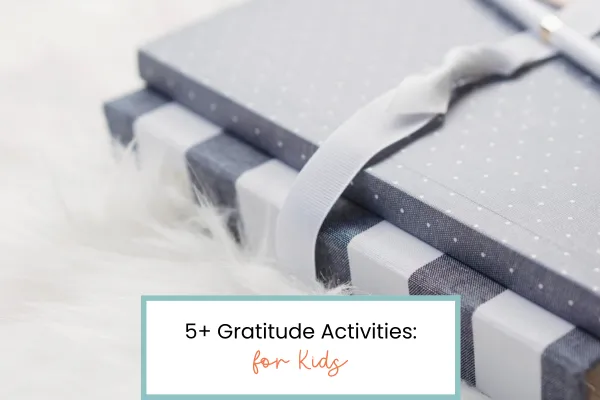

5+ Gratitude Activities for Kids
We all know that teaching our kids the ABCs and 123s is crucial, but what about those essential life lessons that shape them into kind, considerate, and grateful individuals?
We live in a world that is filled with entitlement and people who are just plain ungrateful. The Bible talks about how God hates un-thankfulness (un-gratefulness) more than anything.
Romans 1:21 says, "Because that, when they knew God, they glorified him not as God, neither were thankful; but became vain in their imaginations, and their foolish heart was darkened." (my emphasis added)
So, here's the issue with the people that are being described here. They had turned their back on God. Wanted nothing to do with Him.
But the worst part? They weren't thankful. It's the ultimate slap in God's face.
I know you feel the same as I do: I don't want to raise ungrateful children.
The question is, how can we teach our children to be thankful? Like I'll mention a bit later, it's more than just saying "thank you" (although that's part of it).
We can start with creating gratitude activities.
Let's explore some creative and fun ways to teach gratitude, including journal ideas and prompts.
So, grab a cup of coffee (or tea), and let's dive into the wonderful world of gratitude!

Click here to download the above image.
Why Teach Gratitude?
Before we jump into the activities, let's talk about why teaching gratitude is so important.
Gratitude is more than just saying "thank you"; it's about recognizing and appreciating the good things in life, no matter how small.
Studies have shown that practicing gratitude can:
Increase happiness and overall life satisfaction
Improve physical health
Strengthen relationships
Reduce stress and negative emotions
As homeschooling moms, we have a unique opportunity to incorporate gratitude into our daily lessons and routines. To teach this valuable life skill.
Let's look at some ideas for teaching gratitude.
Fun and Creative Gratitude Activities for Kids
1. Gratitude Journals
Daily Entries: Encourage your kids to write down three things they're grateful for each day. It could be as simple as enjoying their favorite breakfast or as special as a hug from a sibling.
Gratitude Prompts: Use prompts to spark their creativity and reflection. Some examples include:
"What is something kind someone did for you today?"
"Describe a time when you felt really happy."
"What is your favorite thing about your family?"
"Write about a place that makes you feel safe and happy."
"Who is someone you're thankful for, and why?"

Click here to download the above image.
2. Gratitude Jar
How it works: Decorate a jar together and label it as the "Gratitude Jar." Throughout the week, each family member can write down things they're grateful for on slips of paper and add them to the jar. At the end of the week, read them aloud and reflect on the positive moments.
Benefits: This activity not only encourages daily gratitude but also fosters a sense of community and shared joy.
3. Thank You Notes
Writing Practice: Have your kids write thank-you notes to friends, family members, or even community helpers like firefighters and mail carriers. It's a great way to practice writing skills and express appreciation.
Creative Touch: Let them get creative with colorful drawings and decorations on their notes to make them even more special.

4. Gratitude Walks
Nature Appreciation: Take a walk outside and encourage your kids to notice and appreciate the beauty around them. Ask them to point out things they're grateful for, like the chirping birds, blooming flowers, or the warm sunshine.
5. Gratitude Art
Expressing Gratitude Through Art: Let your kids create drawings or paintings of things they're thankful for. This could be family, pets, favorite activities, or anything that brings them joy.
Show and Tell: Have a mini art exhibition at home where each child can present their artwork and explain why they're grateful for what they drew.
6. Family Gratitude Rituals
Gratitude Circle: Before bedtime or dinner, gather in a circle and have each family member share one thing they're grateful for that day. It's a wonderful way to end the day on a positive note.
Gratitude Calendar: Create a monthly gratitude calendar where each day is assigned to a family member to note down something they're thankful for. By the end of the month, you'll have a beautiful collection of gratitude moments.

Click here to download the above image.
Gratitude Journal Ideas and Prompts
I realize we already talked about having a gratitude journal, but I just wanted to reiterate how important it is to write these things down. It really is a fantastic way for kids to reflect on their blessings and develop a habit of thankfulness.
Here are some more ideas and prompts to get you started:
Personal Gratitude List: "List five things that made you smile today."
Grateful for Others: "Write about a friend who always makes you laugh."
Nature Gratitude: "Describe your favorite place in nature and why you love it."
Grateful Memories: "Think of a happy memory and write about why it's special to you."
Acts of Kindness: "What is something kind you did for someone else recently? How did it make you feel?"
Children enjoy decorating with stickers and drawings! This could be a way to also encourage creativity and boost the enjoyment of writing in their journals.

Teaching gratitude is one of the most valuable lessons we can impart to our children. It helps them grow into compassionate, resilient, and joyful individuals. As homeschooling moms, we have the perfect opportunity to integrate these gratitude activities for kids into our daily routines, making learning both fun and meaningful.
Remember, it's the little things that count. Whether it's a simple thank-you note, a gratitude jar, or a daily journal entry, each act of gratitude adds up to a happier and more fulfilling life. So, let's embrace these activities with open hearts and watch our kids blossom into grateful, kind-hearted individuals.
And be sure to take advantage of the free downloads I've included in this post! These can be laminated so you can use them over and over again without having to always reprint them. Enjoy!

